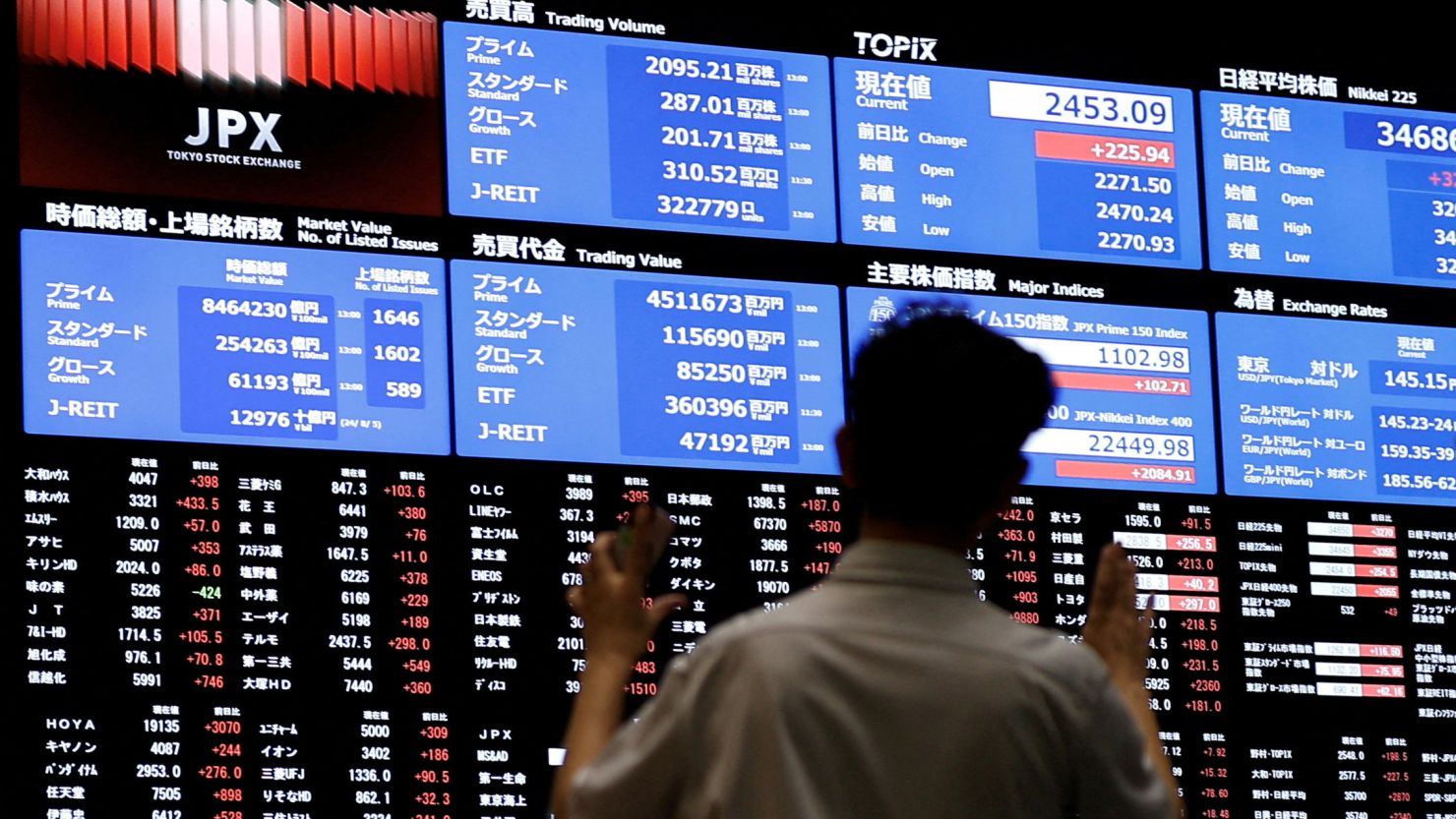An economic shockwave reverberated across Asia on Monday as U.S. President Trump’s surprise tariff hike and China’s aggressive response sent investors fleeing and markets into a tailspin.
Tokyo, Hong Kong, and Shanghai Lead Region-Wide Collapse
Asian markets were pummeled at the open Monday, deepening a global stock rout ignited by the latest escalation in the U.S.-China trade war. Japan’s Nikkei plunged over 8% shortly after the open, while the broader Topix index shed more than 6.5% despite staging a mild recovery.
On the mainland, the Shanghai Composite Index dropped 6.7%, and the blue-chip CSI300 sank 7.5%. In Hong Kong, the benchmark Hang Seng nosedived over 12%, with Chinese tech titans Alibaba and Tencent falling more than 14% and 10%, respectively.
“Washington’s shock decision to impose a 34% tariff on Chinese goods dealt a direct blow to core export sectors like semiconductors and EVs (electric vehicles), triggering a sharp and broad-based repricing across Asian markets,” said Dilin Wu, research strategist at Pepperstone, CNN reported.
She added that a surge in trading volume in Hong Kong was “a clear sign of widespread forced liquidations and what can only be described as a full-blown panic.”
Global Panic Accelerates: $5.4 Trillion Wiped Out on Wall Street
The Asian crash followed the worst two-day stretch for U.S. markets in five years. Futures plunged Sunday night after back-to-back sell-offs erased over $5.4 trillion in market value.
At the center of the storm: President Trump’s surprise announcement of new tariffs, followed by China’s sweeping retaliation — a 34% tariff on all US goods.
The People’s Daily, China’s official Communist Party newspaper, struck a defiant tone: “Faced with America’s reckless tariff punches, we know exactly what we’re dealing with, and we have plenty of countermeasures at hand. After eight years of trade war with the U.S., we’ve built up a wealth of experience in this struggle.”
Taiwan, South Korea, and Australia Hit by Circuit Breakers
Taiwan’s benchmark Taiex plunged 9.7% after the open, as export giants TSMC and Foxconn both dropped around 10%, triggering automatic circuit breakers.
In South Korea, the Kospi index dropped over 4.8%, halting trading briefly after volatility safeguards were triggered. Australia’s ASX 200 fell as much as 6.3%, and New Zealand’s NZX 50 closed down 3.7%.
Oil prices joined the slump: Brent crude lost 2.4%, and U.S. West Texas Intermediate slid 2.5%. Even gold, typically a safe haven, lost its shine, dropping over 4% to around $3,030 an ounce since Thursday.
Trump: “I Can’t Tell You” Where Markets Go Next
Speaking aboard Air Force One Sunday evening, President Trump shrugged off concerns. “What’s going to happen with the market? I can’t tell you,” he said. “But I can tell you, our country has gotten a lot stronger, and eventually it’ll be a country like no other.”
Trump said he’s open to striking a deal with China — if Beijing reduces its trade surplus. “I’m willing to deal with China, but they have to solve their surplus. We have a tremendous deficit problem with China.”
According to the U.S. Trade Representative, the U.S. imported $438.9 billion in goods from China last year while exporting only $143.5 billion.
Allies Push Back: Japan and Taiwan Seek Exemptions
The tariff escalation has alarmed key allies. Japanese Prime Minister Shigeru Ishiba said Monday he would urge the US to reconsider its 24% tariff on Japanese imports, which takes effect later this week. “Japan is not doing anything unfair,” Ishiba said, adding he hoped to visit the US “as soon as possible.”
In Taiwan, President Lai Ching-te said Taipei would work with Washington to remove mutual tariffs and address non-tariff barriers. “We want to make it clear to the US just how much Taiwan contributes to the US economy,” Lai said, adding that Taiwan would boost purchases of US goods and had submitted a new military procurement list.
Economic Forecasts Slashed as Damage Spreads
Economists at Barclays now expect the trade war to deal deeper damage to Asia’s growth prospects, warning in a Monday note that governments in South Korea and Singapore may struggle to negotiate meaningful relief from U.S. tariffs. The bank has begun trimming regional economic growth forecasts.
Ronald Temple, chief market strategist at Lazard, said the scale and speed of tariff hikes are likely to cause greater harm than a more gradual escalation. “As a result of these large tariff hikes, I now expect the economic damage to be more severe than would have been the case in a gradual escalation,” he wrote, according to CNN.






